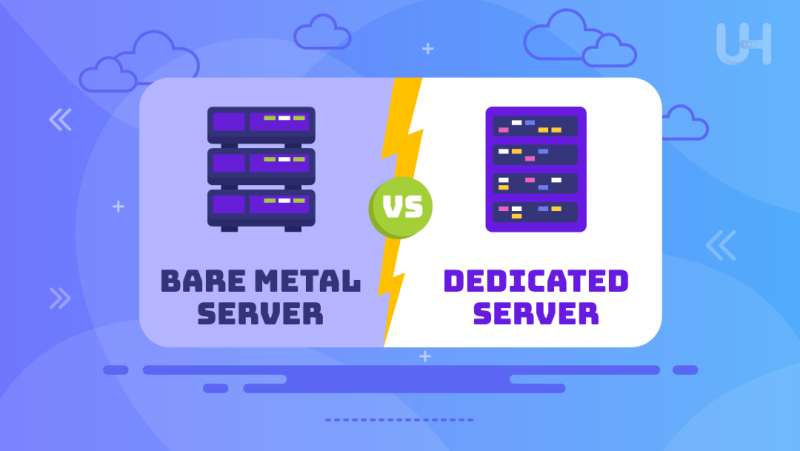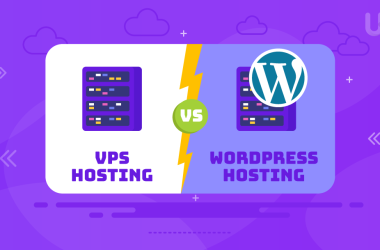Most businesses are often confronted with a hosting solution featuring a bare metal server vs dedicated server when they have to choose. Each option encompasses various benefits that will work wonders for performance, reliability, and security. But these terms have often been thrown around indiscriminately, thereby confusing many. Knowing the difference between these two kinds of servers is important in picking the best solution for the needs of an organization.
In this article, we will explain the difference between a bare metal server vs dedicated server. After analyzing their characteristics, advantages, and disadvantages, you will have a better idea of what each server offers and, therefore, can select which of the two best fits your needs.
What is a Bare Metal Server?
The bare metal server is a physical server completely dedicated to one tenant or client and has no virtualization layer. It provides access to raw hardware for the user to install their preferred operating system and applications directly. Bare metals are good for workloads needing high performance and direct access to hardware resources, like dedicated gaming servers and data analytics, including machine learning applications.
Due to its architecture, a bare metal server offers excellent performance with minimum latency. Because it does not have a hypervisor layer, as is common in virtualized environments, there has been no overhead resulting from resourcing sharing with other users, and the client is left in full control over the server’s resources.
Advantages
- High performance: Full access to the server’s CPU, memory, and storage, allowing maximum performance.
- Customizability: Freedom to install the operating system and applications of choice, and configure hardware settings.
- Enhanced security: No shared resources, reducing the risk of cross-tenant vulnerabilities.
- Predictable performance: No virtualization, meaning consistent and predictable performance without resource sharing.
- Scalability: Bare metal servers can handle large workloads and can be scaled as needed.
Disadvantages
- Higher Cost: Bare metal usually comes more expensively compared to the virtualized solution.
- Longer time of provisioning: Setting and deployment can take more time if virtual machine servers are considered.
- Limited Flexibility: Once a bare metal server is set up, changing its hardware configuration is usually difficult.
What is a Dedicated Server?
A fully managed dedicated server is a physical server that hosts resources assigned to a single tenant. Unlike a bare-metal server, a dedicated server can be virtualized at the environment level with an operating system to provide easier management and flexibility. Low-cost dedicated servers are a perfect platform for hosting websites, applications, and databases that require higher reliability and performance than shared server hosting.
Dedicated servers can be customized, and although they sometimes come with a hypervisor, they provide robust and reliable performance for many applications. The result has been that dedicated servers have become one of the favorites for all businesses where there is a need for dedicated resources with strong manageability and flexibility.
Advantages
- Reliable performance: Dedicated resources ensure stability and reliability.
- Security: Reduced risk of attacks due to a single-tenant setup and options for additional security measures.
- Manageability: Often comes with managed services and virtualization options for better control.
- Cost-effectiveness: Usually less expensive than bare metal servers due to virtualized management options.
Disadvantages
- Potential virtualization overhead: There might be minor performance hits if using virtualization.
- Not fully customizable: Some dedicated servers have more limited configuration options than bare metal.
- Longer provisioning times: Like bare metal, dedicated servers can require more setup time than cloud-based solutions.
Power Your Business with Bare Metal Servers!
Looking for unmatched performance and full control over your server environment? UltaHost’s bare metal server hosting gives you exclusive access to high-performance hardware. It is perfect for handling intensive workloads and ensuring top-notch security.
Bare Metal Server vs Dedicated Server: Head-to-head Comparison
Both bare metal and fast dedicated servers have advantages, but understanding how they differ can help narrow down the best option for your workload. Here’s a head-to-head comparison of bare metal server vs dedicated server:
| Feature | Bare Metal Server | Dedicated Server |
| Virtualization | No virtualization layer; direct access to hardware | May include virtualization for easier management |
| Performance | Maximized performance due to lack of overhead | Reliable, though can be impacted by virtualization |
| Cost | Generally higher due to raw hardware access | Typically more affordable with flexible options |
| Provisioning Time | Longer setup times for full hardware installation | Can vary but often similar to bare metal servers |
| Customizability | Full control over hardware and software | High control, but may be limited by virtualization |
| Use Cases | Intensive workloads (e.g., AI, data analytics, gaming) | Web hosting, applications, and databases |

Unsurprisingly, the list of advantages for bare metal server vs dedicated server has a lot in common. Both are popular for businesses needing stable, high-performing hosting options. Let’s go over their shared key benefits:
- Exclusive Resources: Both servers dedicate all resources, including CPU, RAM and storage, to one tenant, who enjoys predictable, consistent performance without interference from other competing users.
- Enhanced Security: Both server options offer a secure environment, with resources isolated from other tenants. This reduces the risk of cross-tenant vulnerabilities and allows for greater control over security configurations.
- Customization: Besides the choice of operating system, there is much room for customization in both dedicated and bare-metal servers. Businesses can easily select software and applications that best suit their needs and enhance performance for certain workloads, among other things.
- Scalability: Although this will take more time to set up than would be the case with cloud-based facilities, both types of servers can manage big, high-demand applications. The servers allow flexibility in scaling up when business needs increase, thus being quite suitable for a company that plans growth in the long run.
These benefits reinforce one another, making dedicated and bare-metal servers ideal for enterprises looking for the right mix of performance, security, and scalability.
Dedicated Server vs Bare Metal Server: Use Cases
Both bare metal and dedicated servers serve different needs. It is crucial to understand which server type best suits specific use cases.
Bare Metal Server
- High-Performance Computing: This is useful for very useful applications that require high computation powers, such as those related to machine learning, AI, and big data analytics.
- Gaming Servers: Game server hosting provides low latency with high-performance output required for multi-user game applications.
- Financial applications: Ideal for financial institutions that require secure, high-performance environments for transaction processing.
- Custom infrastructure requirements: Bare metal servers are ideal when a business needs complete control over its infrastructure, including specific OS and hardware configurations.
Dedicated Server
- Web Hosting Service: Reliable and secure for businesses hosting websites with consistent traffic.
- Corporate applications: Used by companies to host internal applications, CRMs and ERPs that need dedicated resources.
- Database hosting: Provides a stable database environment that requires high reliability but may not demand raw hardware access.
- E-commerce platforms: Dedicated servers can provide the security and consistent performance needed for e-commerce sites handling sensitive data and payments.
Conclusion
The choice will need to be made based on your business’s needs, whether a bare metal server or dedicated server is right for you. Both have different types of benefits. Bare metal servers will excel in high-performance, resource-intensive applications, while dedicated servers can offer a reliable and affordable solution for various general-purpose needs. By understanding the differences, you can select the best solution that balances your workload’s performance, security, and cost-effectiveness.
UltaHost’s SSD dedicated server offers enhanced performance with lightning-fast data access for businesses seeking speed and reliability. Experience dedicated resources optimized for today’s demanding applications and workloads.
FAQ
What’s the difference between a bare metal and a dedicated server?
Bare metal offers direct hardware access, while dedicated servers may include virtualization for easier management.
Which server is more cost-effective?
Virtualization makes Dedicated servers more affordable, while bare metal servers are pricier.
Can I customize a dedicated server’s hardware?
Yes, but bare metal servers offer more extensive customization options.
Who benefits most from bare metal servers?
Businesses like gaming, data analytics, and AI applications need high performance.
Are dedicated servers good for website hosting?
Yes, they offer reliable performance and security for websites with consistent traffic.
Which server is more secure?
Both are secure, but bare metal servers may offer slightly better security due to no virtualization.
Can I scale a bare metal server easily?
Scaling is possible but may take longer compared to cloud-based or virtual solutions.











